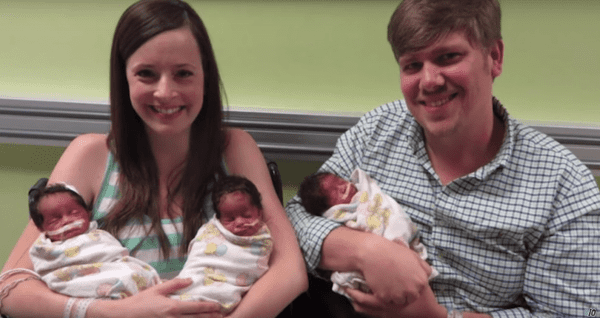
Aaron Halbert and his wife Rachel are white evangelical Christians who just gave birth to three black children, who they first adopted as embryos.
These three babies will join their siblings, a 3-year-old African-American brother and a 2-year-old biracial sister, Aaron Halbert wrote in an opinion piece for The Washington Post.
While this may seem like something normal for some, Halbert explained that there was nothing ordinary about their journey to adopt. He and his wife felt that their pro-life political stance required them to get involved with adoption in this way.
So when they went to an adoption agency, they asked for a baby of any race - except Caucasian.
"We did this with the deeply held conviction that if the Lord wanted us to have a fully Caucasian child, my wife would conceive naturally," he wrote.
He said the process of adoption isn't meant to help children escape a troubled life or to serve certain political agendas, though. The Halberts chose to adopt to serve God.
"We see protection of children not as charity, nor as part of a political agenda, but as something near to the heart of God," he wrote. "Because every human life bears his image, all life -no matter how young or old, no matter the stages of development - has inherent dignity and value. The Scriptures testify that God has always pleaded for the protection of his most helpless and needy image-bearers. Another prevalent theme of the Bible is that God adopts believers into his own family. When we adopt, we are echoing his own compassionate work, giving the world a glimpse of the truth and beauty of the gospel."
Of course, they knew that adopting children from a different race wouldn't be easy for the couple. Not only did they live in the South - which "would draw a myriad of different reactions" from people - but it's just not a cultural norm for white couples to adopt so many black children.
After they adopted two black children, they went a step farther and decided to extend their family by adopting embryos from the National Embryo Donation Center. They decided to once again adopt children from African-American descent. They chose two embryos. After a doctor's visit, they found that one of the embryos had split. Three babies were on the way.
"This is not the way we planned it 12 years ago when we were dating and talking about adoption, but oh, how thankful we are for God blessing us with these sweet little ones He has placed in our care," he wrote.
Embryo adoption has quietly become a major option for parents who are interested in adopting. After couples adopt these embryos, they are placed in a mother's womb for her to eventually give birth to them - a mix of the natural and adoption processes.
There are in fact more than 625,000 embryos that are available for adoption. Many are frozen in storage, but many are available for donation. Success rates hover around 50 percent for couples who choose this option, and it's relatively affordable for couples, costing between $2,500 and $4,000.
"While embryo donation is not for everyone, it can be an opportunity for many who have given up hope of ever raising a child," according to the National Embryo Donation Center.
The Halberts aren't the only American couple to embrace the trend. Liz Krainman, who had a "severe diminished ovarian reserve, a condition that leaves her unable to have genetic children," decided to adopt embryos with her husband Kevin, according to People magazine.
They first decided in 2006. When they did, the embryo that would eventually grow up to be Sammy Krainman was located in Austin, Texas. It was a fresh new product created by another couple's in-vitro fertilization cycle. It wasn't until 2013 that the future Sammy embryo would be brought out of frozen storage to become the baby she is today.
"I can't even begin to tell you how boggled my mind is," Liz Krainman said. "I can't even wrap my head around it."
But there's still some legal considerations with embryo adoption. According to Pacific Standard, only eight states have policies that regulate embryo donation, and sometimes it creates legal ramifications about who the real parents are.
"In most states, the birth mother is a child's legal mother; if she is married to a man, her husband is the child's father. Where no superseding embryo-related law exists, a child who develops from an adopted embryo legally belongs to her birth parents," according to Pacific Standard.
This also opens up questions about the legal status of embryos, something that politicians and policymakers have chosen to avoid addressing because they don't want to legalize fertility treatments overall, Pacific Standard reported.
In some cases, embryos are treated as property, which means that the creators of those embryos have ownership of them. Theoretically, that means a sperm donor could be ordered by a judge to pay child support for these children, according to Pacific Standard.
These legal issues won't go away anytime soon, at least not until policymakers or courts figure out the legal standing, according to Pacific Standard. Once it does, the process could become a lot smoother, giving more families a chance to adopt embryos.
"The full promise of embryo adoption cannot be realized until the law catches up to technology to protect the rights of parents in this brave new variation on adoption." Pacific Standard wrote.
Related links
When adoption means more than simply becoming parents
How Sandra Bullock is helping parents who adopt build a new family
Adoption is the very best second-best solution

